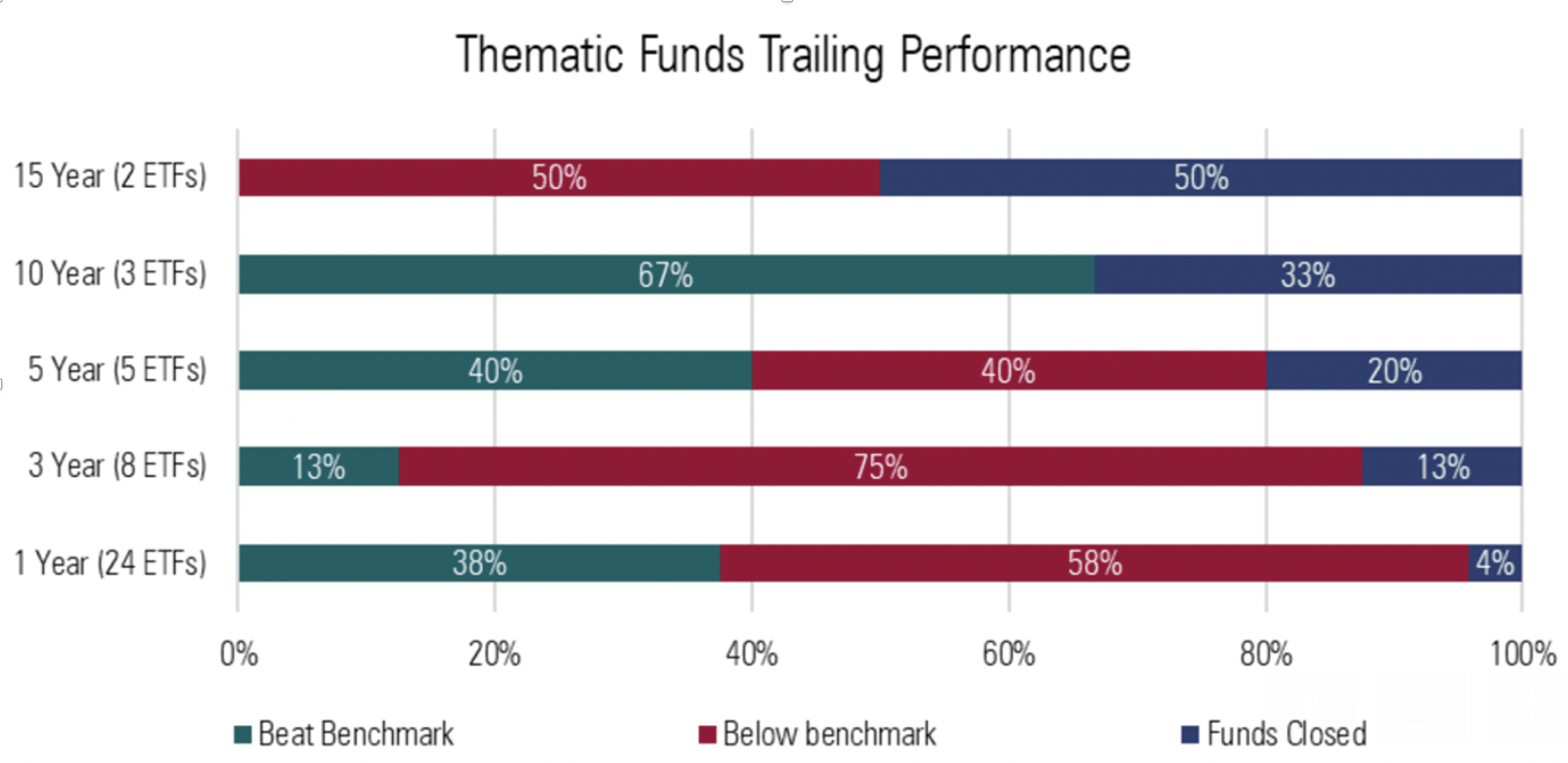75% of thematic ETFs have underperformed the market over 3 years. Are they still worth it?
The market’s current exuberance around Artificial Intelligence (AI), sparked by the release of ChatGPT, underscores the popularity of thematic investing.
However, Morningstar research shows that over 3 years (the industry's most watched performance time horizon), 75% of thematic ETFs underperform the MSCI World ex Australia as of June 2023.
Admittedly, that performance does improve over longer time horizons, but the sample size of funds falls dramatically due to the relative infancy of the ETF industry.

This begs the question - is thematic investing a viable long-term investment, or a flash in the pan better suited to short-term tactical traders?
I reached out to Cameron Gleeson, Senior Investment Strategist at Betashares, for his take on the underperformance and the role thematic ETFs can play in investors' portfolios.
Why have thematic funds underperformed over three years?
Thematics tend to be long-term by nature. While AI, for instance, has exploded in interest recently, that's because the technology is just now finding its way to the broader market.
For this reason, Gleeson believes 3 years is too short a time horizon.
"Most ETFs in this category recommend a minimum investment period of more than five years, so investors should have a high degree of conviction and a long term time horizon before investing."
The last 3 years have been more volatile than most, favouring more value and cyclical exposures such as energy or materials.
Thematic ETFs, on the other hand, "tend to leverage long-term structural growth opportunities, and as growth exposures their valuation multiples (ie PE ratios) can be more sensitive to rising rates over shorter time frames."
A longer term time frames it is earnings growth, not valuation multiples, as the primary driver of stock price performance.
Betashares point to their Global Cybersecurity ETF, or HACK (ASX: HACK), and the underlying earnings growth in that industry, as evidence of this.
"In the five years to 31 July 2023, HACK has returned 15.20%p.a. while at the same time an ETF tracking the MSCI World Index has returned 11.80%p.a. - far better than the majority of global active equity managers."
Disruption is volatile
Thematics are disruptive by nature, and disruption is volatile.
As a result, thematic ETFs tend to be volatile. But this flattens out as the growing pains subside.
"Thematic ETFs provide investors with exposure to disruptive sectors that are expected to play out over the decades to come," says Gleeson.
"The inherently disruptive nature of the sectors they provide exposure to makes it much harder to pick winners over the long-term."
For instance, today’s leaders in AI might not necessarily maintain their position over the long-term.
"As a result, investors should look to avoid concentrated bets on specific AI names." ETFs help diversify away this risk by holding a basket of companies.
Gleeson adds that that short term the returns of a thematic exposure will be sensitive to valuation multiples, which are in turn driven by market sentiment and interest rate expectations - two considerations that even the most experienced investors struggle to predict.
"We believe it is more appropriate to focus on longer term earnings growth of the stocks associated with an investment thematic, as earnings growth will be the primary driver of longer term performance – hence it is also more appropriate for investors to align their investment time horizon with that longer term view."
Be wary of get rich quick ETFs
While the short-term volatility of thematic investing reinforces the need for a long time horizon, it also attracts speculation.
"Investors should be very wary of thematic ETFs that promise a ticket to quick riches, as they are more likely than not connected to a fad," says Gleeson.
"As a result, investors should take the time to not only assess the underlying theme, but also review the holdings of the fund to ensure it aligns with expectations."
Thematic ETFs are complementary, not core
Thematic investing is concentrated investing, in the sense that investor sentiment often broad brushes whole thematics rather than individual companies. For this reason, thematic exposures should complement, not constitute, the core of a portfolio.
"Investors should first look to build a robust core with broadly diversified exposure to Australian and International equities, bonds, and other assets," says Gleeson.
"Thematic ETFs can then be used to tilt a portfolio to long-term megatrends in the satellite or growth component of the portfolio. These megatrends could include artificial intelligence, cybersecurity or even efforts to address climate change."
Gleeson's pick of the litter
For Gleeson, the global energy transition stands out from the rest.
"There are numerous ways to play this theme via an ETF. For example, our Energy Transition Metals ETF (ASX: XMET) offers investors exposure to the miners and producers of the raw materials that will power the global transition to net zero emissions," he says.
These include copper, lithium, nickel, cobalt, graphite, manganese, silver and rare earth elements.
"As the world makes the transition to net zero, these metals will remain in high demand over multiple decades, while supply is often structurally constrained by numerous factors. As a result, the producers of these metals are expected to enjoy higher prices and represent a compelling investment opportunity."
1 topic
2 stocks mentioned
2 funds mentioned
1 contributor mentioned

